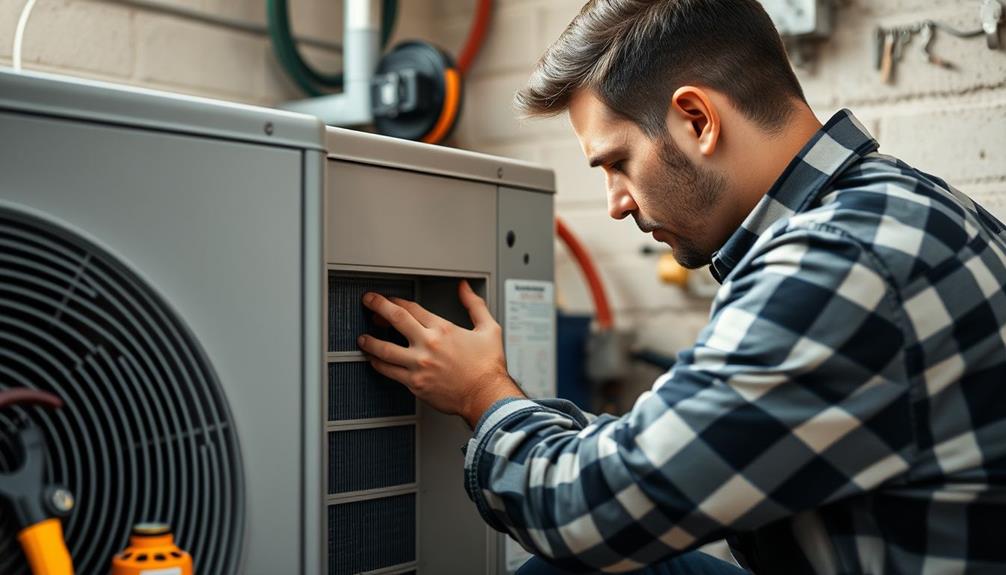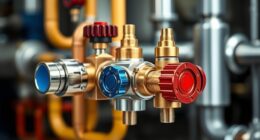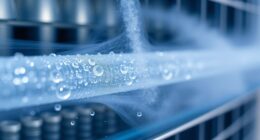To maximize your heat pump's efficiency and lifespan, regular maintenance is key. Start by replacing or cleaning filters every 1-3 months for ideal airflow. Inspect and clean coils, and check that ductwork is sealed tight. Keep at least 18 inches of clearance around your outdoor unit and remove debris as needed. Pay attention to any unusual noises or temperature inconsistencies, as they could signal problems. Schedule annual professional inspections to catch issues early and guarantee your system runs smoothly. There's plenty more you can do to keep your heat pump in top shape, so don't stop here!
Key Takeaways
- Regularly replace or clean air filters every 1-3 months to ensure optimal airflow and efficiency.
- Inspect and clean indoor and outdoor coils to maintain effective heat exchange and prevent breakdowns.
- Schedule annual professional inspections to enhance system performance and fulfill warranty requirements.
- Clear debris around the outdoor unit to prevent airflow obstruction and ensure efficient operation.
- Monitor energy bills for spikes, which may indicate underlying issues needing immediate attention.
Importance of Regular Maintenance
Regular maintenance of your heat pump is critical for guaranteeing its longevity and efficiency. By committing to regular maintenance, you can extend the lifespan of your heat pump from the average 10-15 years to as much as 15-20 years. This means you'll enjoy reliable heating and cooling for longer without the need for costly replacements.
Additionally, well-maintained heat pumps operate 10-25% more efficiently, translating to significant energy savings over time. Proper upkeep also helps prevent common causes of heat pump failures, such as refrigerant leaks and electrical issues, which can arise from neglect. Understanding thermal energy transfer basics can enhance your approach to maintenance, guaranteeing peak performance.
Preventative maintenance helps mitigate the risk of unexpected breakdowns, guaranteeing your system performs reliably during peak seasons. With professional maintenance, you can rest easy knowing your heat pump is in good hands.
Regular upkeep also plays a crucial role in improving indoor air quality. Clean filters and coils reduce allergens and create a healthier living environment for you and your family.
Lastly, keep in mind that many warranties require regular maintenance checks. Staying on top of these tasks not only preserves your warranty but also guarantees you can access potential benefits down the line.
Prioritizing regular maintenance is a smart investment in your heat pump's performance and your home's comfort.
Key Maintenance Tasks
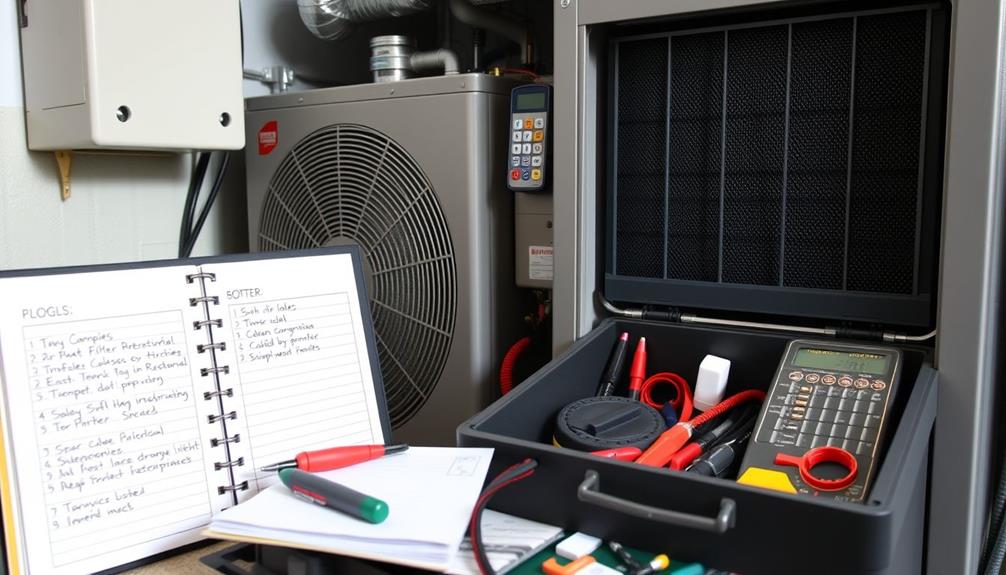
When it comes to keeping your heat pump running smoothly, there are several key maintenance tasks you shouldn't overlook.
First, regularly replace or clean the air filters every 1-3 months to guarantee adequate airflow. Dirty filters can greatly reduce efficiency and account for one-third of service calls.
Additionally, using a Garage Door Openers with advanced technology can enhance your home's overall energy efficiency by maximizing your heating and cooling systems.
Next, inspect and clean the coils of both your indoor and outdoor units. This task promotes effective heat exchange and prevents airflow blockage, guaranteeing your system works efficiently.
Additionally, check and seal any ductwork for leaks; unsealed ducts can lead to energy losses of up to 30%, impacting your energy bills.
Don't forget to test your thermostat settings periodically. Incorrect settings can lead to increased energy consumption, so make sure everything's accurate.
Outdoor Unit Care

Taking care of your outdoor unit is essential for its performance. Regular maintenance, such as clearing away any debris, is vital as it can obstruct airflow and affect efficiency.
Additionally, monitoring the air quality around your unit can help guarantee it operates effectively, much like how air purifiers help reduce allergens.
During winter, make sure to remove ice and snow to prevent damage and keep everything running smoothly.
Debris Clearance Importance
Clearing debris around your outdoor heat pump unit is vital for peak performance. Keeping the area free from leaves, branches, and vegetation guarantees proper airflow, preventing the unit from overheating.
Regular maintenance of your heat pump is as important as hydration is essential for gout management; both practices help in maintaining ideal function. Aim for at least 18 inches of clearance around the outdoor unit to avoid airflow blockage and maintain ideal performance.
Regular maintenance, including cleaning the outdoor unit's coils and fins, is essential. Dirt buildup can considerably reduce heat exchange efficiency, causing energy consumption to spike by up to 25%.
By prioritizing debris clearance, you not only enhance efficiency but also extend the lifespan of your system.
Additionally, if your outdoor unit is elevated 4 to 8 inches above ground level, it promotes proper drainage and minimizes debris accumulation. This setup guarantees consistent operation and reliability.
Ice and Snow Removal
Maintaining your heat pump during winter months goes beyond just keeping debris at bay; ice and snow can greatly impact its performance. Regularly check the outdoor unit for any accumulation of ice or snow, and remove it promptly to prevent airflow blockage and operational inefficiencies.
Keeping a clearance of at least 18 inches around the unit is vital for proper airflow and to minimize debris buildup. Additionally, using a well-draining soil mix can enhance moisture management in nearby plants that may affect the heat pump's environment.
When snow settles on your heat pump, use a broom or brush to gently clean it off. Avoid sharp tools, as they can damage the unit's fins or casing. Elevating the outdoor unit 4 to 8 inches above ground level can enhance drainage, preventing water from pooling around the base, which could freeze and cause damage.
Additionally, monitor how frequently the unit goes into defrost mode. If it's happening often, it might signal underlying issues that need professional inspection.
Signs of Potential Issues
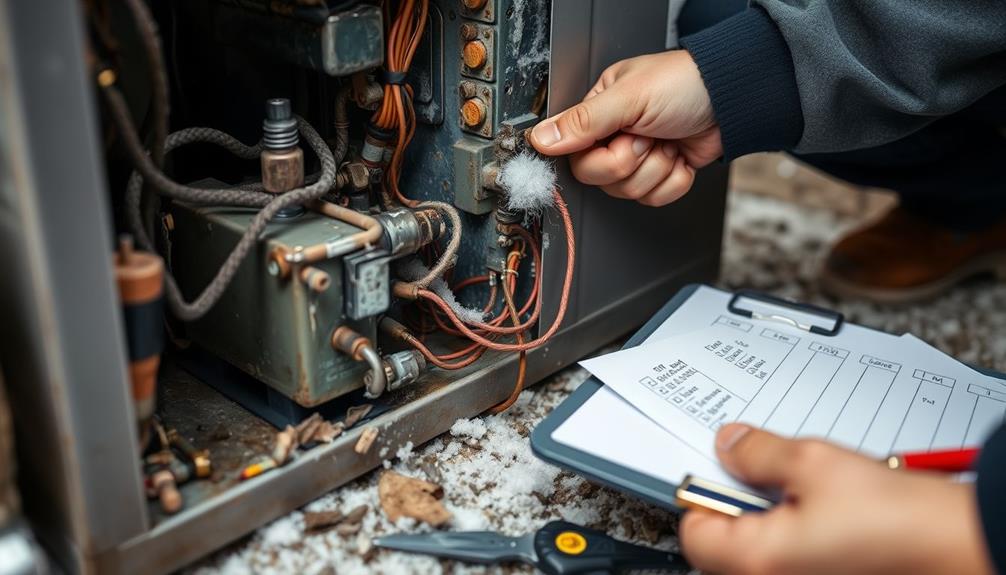
You should pay close attention to your heat pump for any unusual noises during operation, as they might signal mechanical issues.
Issues with your heat pump can lead to inefficiencies, similar to how credit cards play an essential role in personal finance management, making it vital to address any problems promptly.
If you notice inconsistent heating or cooling, it could mean there are inefficiencies that need addressing.
Additionally, keep an eye on your energy bills; a sudden increase might indicate underlying problems that require your attention.
Unusual Noises During Operation
During operation, your heat pump might emit unusual noises that can signal underlying issues needing attention. Grinding or squealing sounds could indicate mechanical issues with the motor or compressor, which may require immediate intervention.
If you hear a rattling noise, it could mean loose parts or debris inside the unit, potentially leading to operational inefficiencies if not addressed promptly. Proactive monitoring of your heat pump's performance is crucial for maintaining its efficiency and longevity, especially considering the importance of email and communication security in preventing unauthorized access to smart home devices.
Frequent cycling on and off, accompanied by audible clicks or thumps, may suggest thermostat malfunctions or electrical problems affecting overall system performance. Pay close attention to these sounds, as they can impact your heat pump's reliability and efficiency.
Ice buildup on the outdoor unit, especially when you notice hissing or bubbling noises, can indicate refrigerant leaks or airflow issues that need urgent investigation.
Regularly monitoring for these unusual noises allows for early detection of potential problems, ultimately saving you from costly repairs and maintaining system efficiency. By staying vigilant and addressing these signs promptly, you can guarantee your heat pump operates smoothly and lasts longer.
Don't ignore those sounds—your heat pump's health depends on it!
Inconsistent Heating or Cooling
Inconsistent heating or cooling can be a frustrating experience, often signaling underlying issues with your heat pump.
When your system struggles to maintain a comfortable temperature, it's important to identify the potential culprits that could be affecting its performance. Regular maintenance is vital, as it not only enhances efficiency but also extends the lifespan of your unit.
For example, verifying that your heat pump is regularly serviced can prevent common problems that lead to important home cleaning kit items.
Here are some signs to watch for:
- Airflow issues: Poor airflow can lead to uneven temperatures throughout your home.
- Dirty or blocked filters: These should be inspected and replaced every 1-3 months to guarantee peak performance.
- Refrigerant leaks: A drop in efficiency may stem from low refrigerant levels, requiring a licensed professional to check every 2-3 years.
- Mechanical problems: Unusual noises, like grinding or squealing, can indicate serious issues needing immediate attention.
- Frost or ice buildup: If you notice this on the outdoor unit during warmer months, it could signal airflow issues or refrigerant problems.
Increased Energy Bills
Noticing increased energy bills can be a clear indicator of potential issues with your heat pump. If you see a spike in your monthly costs, it's crucial to investigate further. One common culprit is dirty air filters that restrict airflow, causing your heat pump to work harder and consume up to 25% more energy.
Healthy lifestyle blogs often emphasize the importance of regular maintenance, which can greatly improve efficiency. Refrigerant leaks can also lead to inefficiency, making it tough for the system to maintain desired temperatures, which drives up your energy bills.
Frequent cycling on and off might suggest problems with the thermostat or airflow obstructions, leading to unnecessary electricity use. Additionally, if the outdoor unit is blocked by debris or ice, it hampers heat exchange and forces the system to expend more energy.
If you notice a decrease in heating or cooling efficiency, it might signal the need for professional maintenance. Issues like compressor problems or electrical faults can drain energy, reducing potential energy savings.
Staying vigilant about these signs can help you address problems early, ensuring your heat pump operates efficiently and minimizes those increased energy bills.
Seasonal Maintenance Checklist
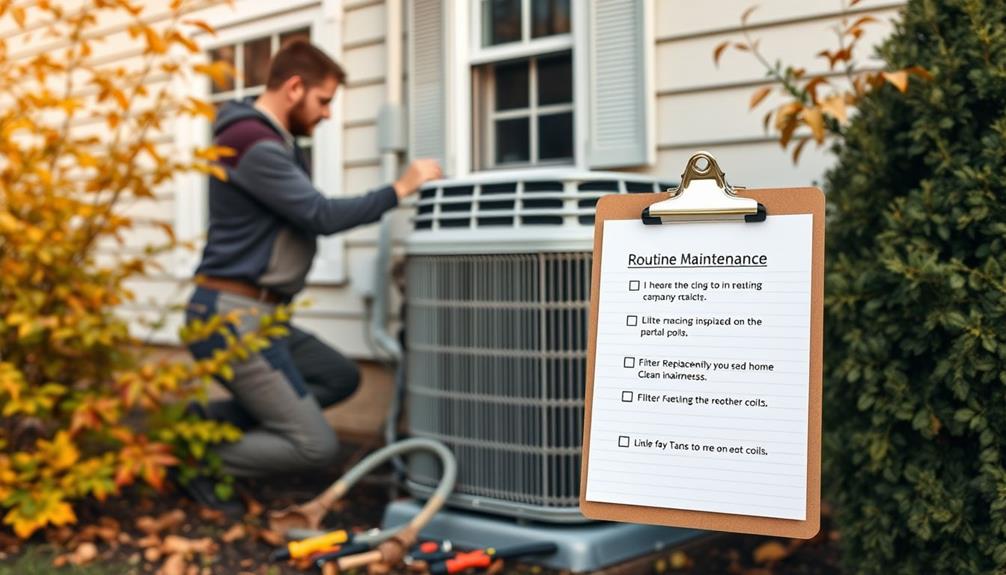
To keep your heat pump running efficiently year-round, a seasonal maintenance checklist is essential. By following these steps, you can guarantee your system operates at peak performance during both heating and cooling seasons.
Regular maintenance is akin to the self-cleaning brush roll on a vacuum, as it helps prevent buildup and inefficiencies. For instance, self-cleaning features in vacuums reduce the need for frequent maintenance, much like how routine checks can enhance your heat pump's performance.
- Before winter: Check refrigerant levels and verify insulation around ducts is intact to minimize energy loss.
- In spring: Clean outdoor units by removing debris and confirming at least 18 inches of clearance to promote ideal airflow.
- Before summer: Inspect and clean your regular filter every 1-3 months, as dirty filters can greatly reduce airflow and efficiency.
- Seasonal shifts: Regularly monitor system performance and verify proper drainage of condensate lines to prevent clogs.
- Annual check: Hire a professional for inspections to assess system performance and identify potential issues.
Professional Maintenance Benefits
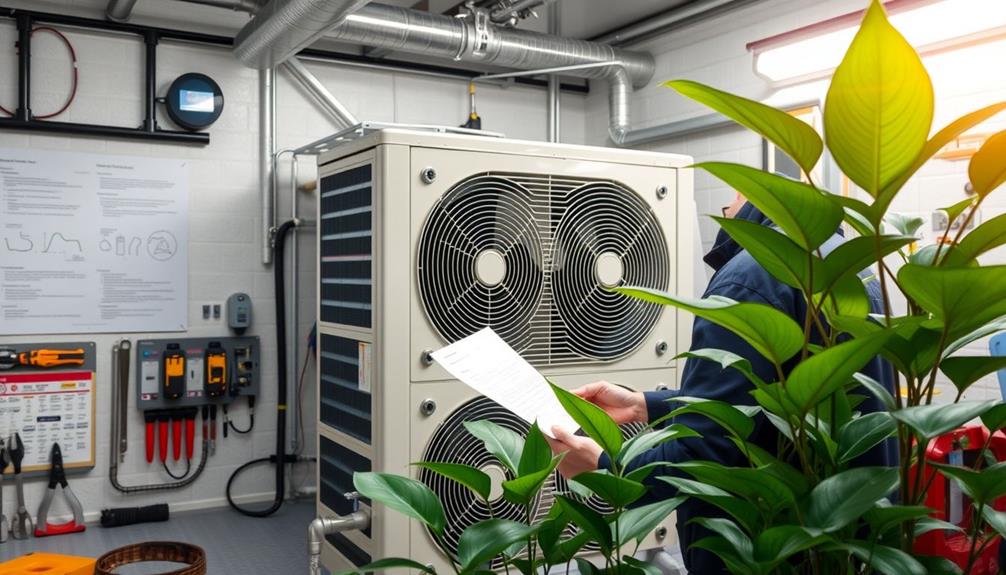
Regular professional maintenance offers numerous advantages that can greatly enhance your heat pump's performance. When you schedule these services, skilled technicians use specialized tools to conduct thorough diagnostics, detecting issues that casual inspections might miss. This guarantees every component of your system functions effectively. Their expert knowledge allows them to identify and resolve potential problems before they escalate into costly repairs.
One significant benefit of regular maintenance is improved energy efficiency. Studies show that well-maintained systems can reduce energy costs by 10-25%. This not only saves you money but also helps reduce your environmental footprint.
In addition, routine servicing often fulfills manufacturer requirements, guaranteeing that your warranty remains valid if you need to make a claim. Technicians also perform deep cleaning and safety checks, enhancing your system's performance while assuring compliance with safety standards.
This reduces the risk of hazardous situations, like electrical fires or refrigerant leaks. Overall, investing in professional maintenance not only maximizes your heat pump's efficiency and lifespan but also brings peace of mind knowing your system is in top shape.
DIY Maintenance Tips
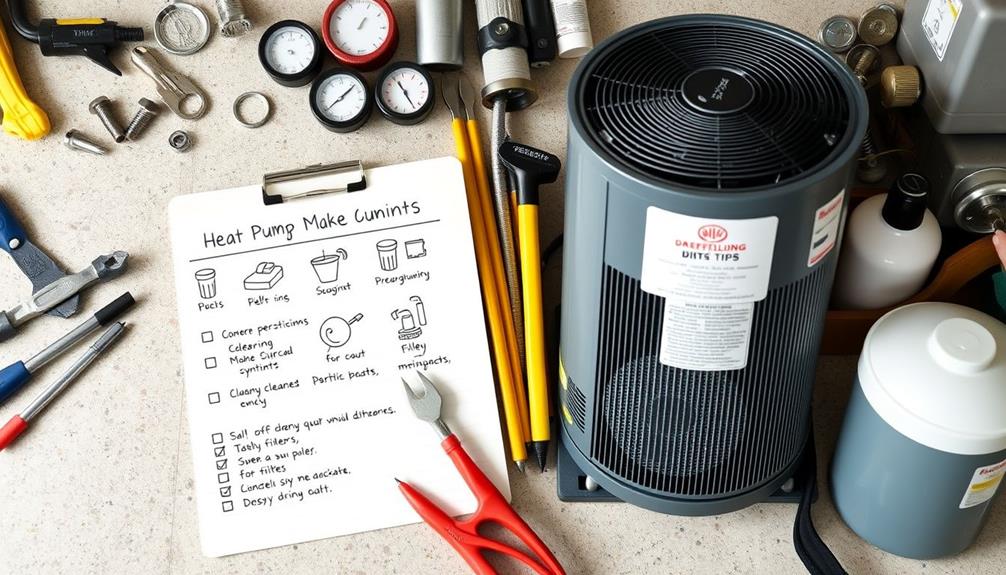
Your heat pump's performance can greatly benefit from simple DIY maintenance tasks that anyone can tackle.
By regularly attending to these tasks, you can guarantee your heat pump operates efficiently and effectively, maximizing both its lifespan and your comfort.
- Check and clean or change indoor air filters every 1-3 months to maintain ideal airflow.
- Inspect and clear debris from the outdoor unit and maintain at least 18 inches of clearance around it to promote efficient operation.
- Verify the tightness and insulation of ductwork to minimize energy loss; leaks can considerably hinder system efficiency.
- Clean the outdoor coils annually to prevent dirt buildup, which can impede heat exchange and decrease performance.
- Confirm the thermostat is calibrated accurately and set consistently to avoid unnecessary energy spikes and maintain the heat.
Cost Considerations
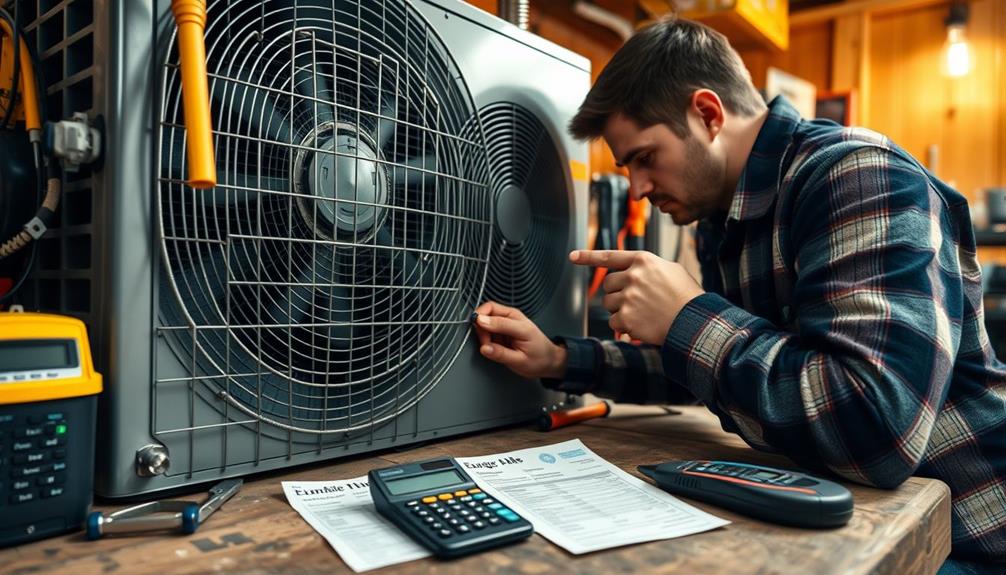
Understanding the cost considerations associated with heat pump maintenance and installation can greatly impact your decision-making process. The average installation cost for heat pumps ranges from $3,000 to $8,000, but keep in mind that potential savings on your utility bills can lead to a quick return on investment.
Annual maintenance costs typically range between $150 and $300, which is essential for ensuring peak performance and longevity of your system. By investing in professional maintenance visits, usually costing between $75 and $150, you benefit from thorough cleaning and safety checks that can prevent costly repairs down the line.
Additionally, look into federal tax credits and local incentives that may help offset your initial installation costs, making the heat pump investment even more financially feasible.
Regular maintenance not only helps you maintain warranty compliance, but it also enhances energy efficiency and reduces long-term expenses. By factoring in these cost considerations, you'll be better prepared to make informed decisions that maximize both the efficiency and lifespan of your heat pump, ultimately saving you money over time.
Troubleshooting Common Problems
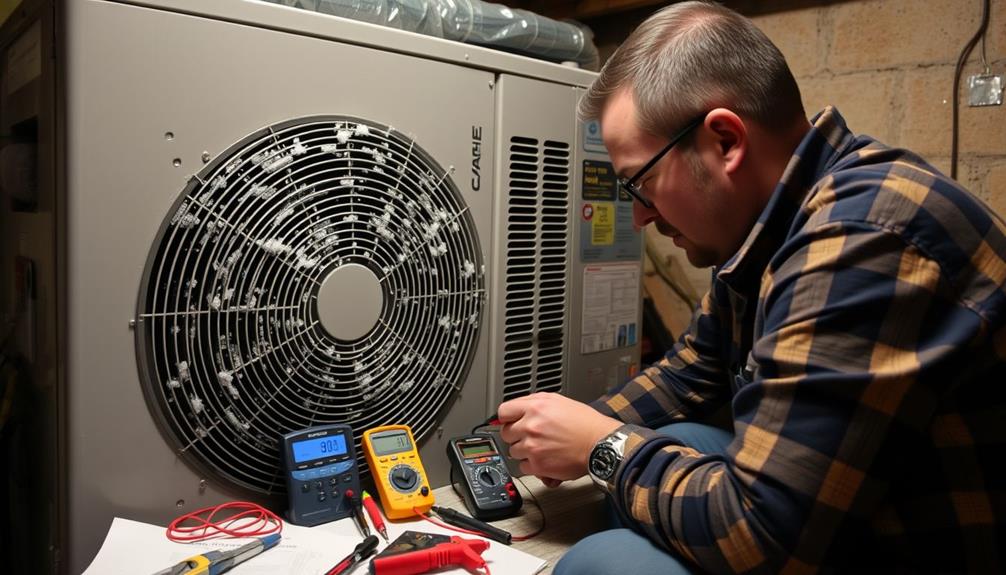
What should you do when your heat pump starts acting up? First, don't panic. You can troubleshoot common problems to keep your system running smoothly.
Pay close attention to unusual noises, like grinding or squealing, as these may indicate mechanical issues that need immediate attention. Frequent cycling on and off can signal thermostat malfunctions or airflow restrictions, which you should address quickly.
Here's a quick checklist to help you identify issues:
- Check for ice buildup on the outdoor unit; this could point to airflow issues or refrigerant problems.
- Verify your thermostat is set correctly to avoid unnecessary cycling.
- Inspect your ducts for leaks if you notice inconsistent heating or cooling.
- Monitor your energy bills; an unexpected increase can indicate a heat pump issue.
- Schedule regular maintenance to catch potential problems early.
Enhancing Energy Efficiency
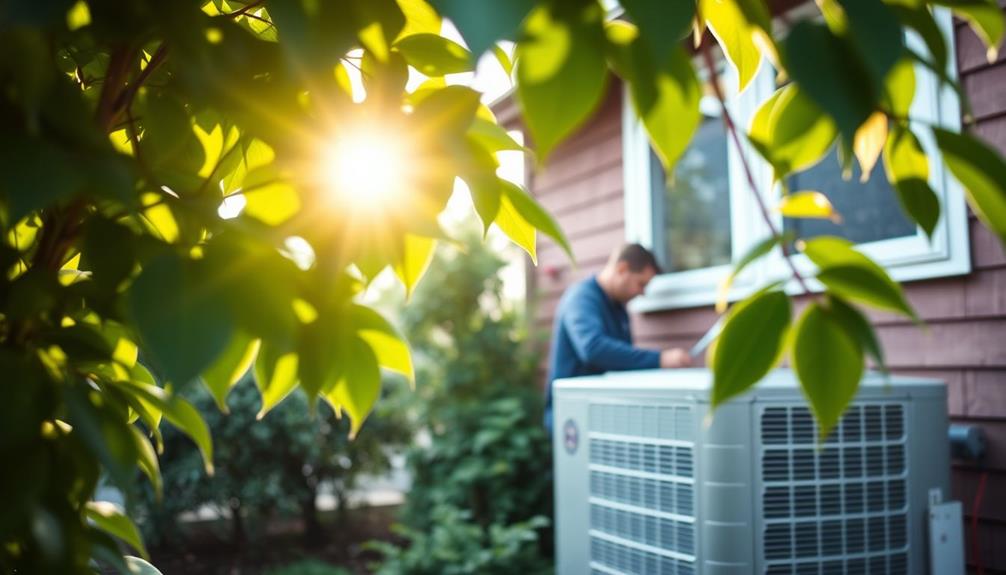
Maintaining energy efficiency in your heat pump can greatly lower your utility bills and extend the system's lifespan. Regular maintenance is essential, so make it a habit to clean or replace air filters every 1-3 months. This simple step can improve your heat pump's efficiency by ensuring ideal airflow and can reduce energy consumption by up to 25%.
Don't overlook your ductwork either. Inspecting and sealing leaks can enhance system efficiency since unsealed ducts can waste 20-30% of the energy used for heating and cooling.
Scheduling annual professional inspections allows for thorough diagnostics and maintenance, helping to prevent unexpected breakdowns while keeping your system efficient during peak seasons.
Additionally, keep the outdoor unit clean and free of debris, ensuring at least an 18-inch clearance around it. This unobstructed airflow is vital for ideal performance.
Finally, consider using a programmable thermostat tailored for heat pump systems. This can lead to energy savings by adjusting temperatures based on occupancy patterns, reducing energy use during off-peak hours.
Frequently Asked Questions
How to Make Your Heat Pump Last Longer?
To make your heat pump last longer, schedule annual inspections, clean or replace filters regularly, and keep outdoor units clear of debris. Monitor refrigerant levels and guarantee ductwork is insulated to enhance efficiency and performance.
How Can I Maximize My Heat Pump Efficiency?
To maximize your heat pump efficiency, regularly clean or replace air filters, schedule annual inspections, maintain clearance around outdoor units, and set a consistent thermostat temperature. These actions can greatly reduce energy consumption and enhance performance.
What Is the Proper Maintenance of Heat Pump?
Your heat pump's maintenance is essential—neglecting it can be catastrophic! Regularly clean filters, schedule annual inspections, and clear outdoor units. Monitor refrigerant levels to guarantee peak performance and enjoy lower energy bills.
At What Temperature Is a Heat Pump No Longer Efficient?
A heat pump starts losing efficiency below 25°F. As temperatures drop further, like around 15°F, it struggles more, leading to higher energy costs and the potential need for supplemental heating to maintain comfort indoors.
Conclusion
By prioritizing regular maintenance, you can boost your heat pump's efficiency and extend its lifespan. Think about it: wouldn't you rather enjoy consistent comfort and lower energy bills? By following the tips outlined, from seasonal checklists to DIY tasks, you can keep your system running smoothly. Don't overlook the signs of potential issues, and remember that a little care goes a long way. So, are you ready to give your heat pump the attention it deserves?
